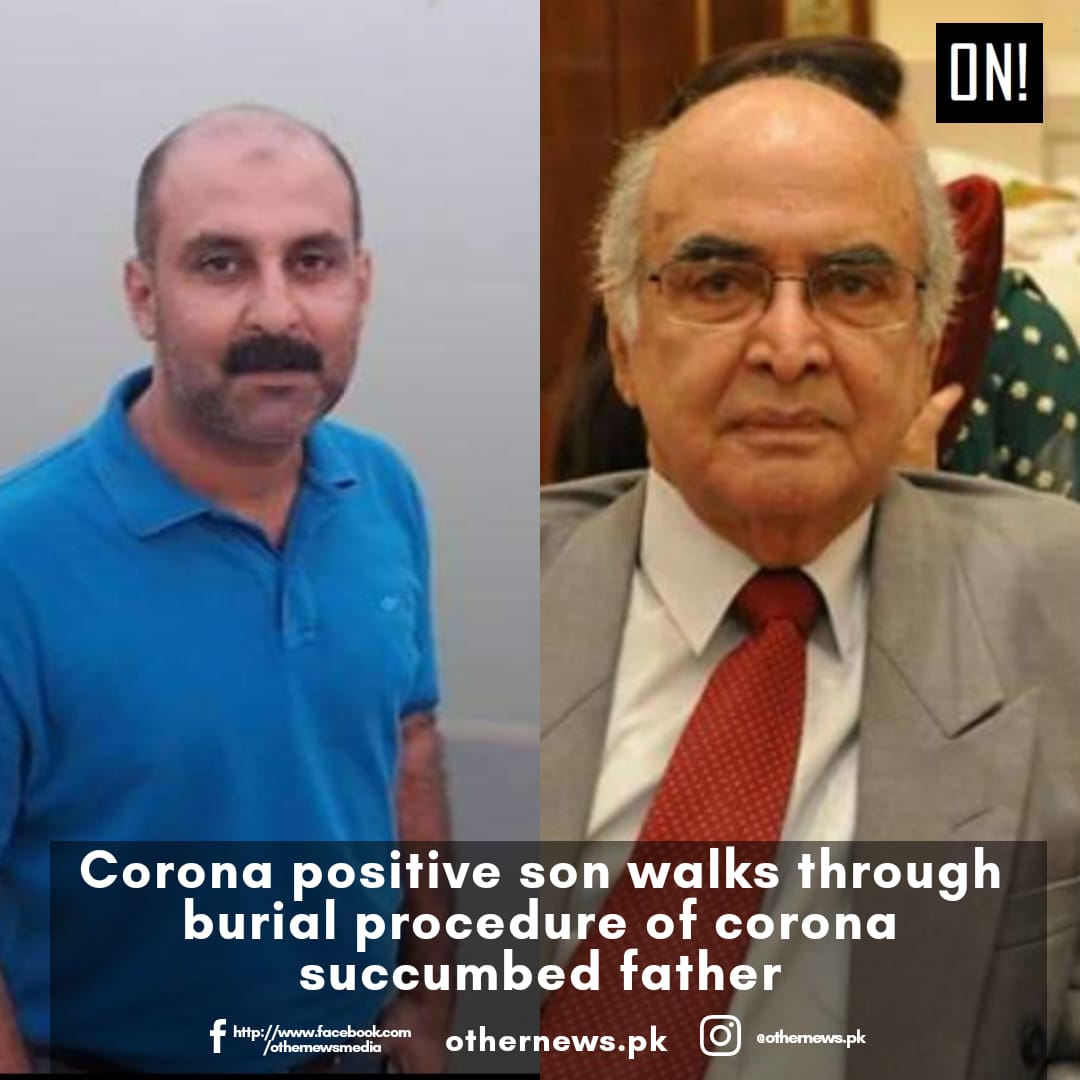It was around noon when Murtaza Waheed received a call from the Assistant commissioner of district East that his father, who was a COVID-19 patient, had passed away. In the same breath he said that according to guidelines of Sindh Government only one person would be allowed to go through the burial procedure and asked him to come over. “I myself have corona,” said Murtaza.
He was told to stay back and to send some other relative of the deceased.
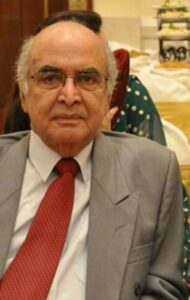
The last time I saw my father was on 30th of March, when he was being sent to the hospital. Never saw his face after that, not even on his funeral. He wasn’t even brought back home for his last bathing rituals. He passed away on the 2nd of April at Aga Khan University Hospital, Murtaza remembered.
Later on the day of his father’s death, Murtaza got calls from special branch saying that he did not have to worry about anything. “They said that the burial, grave, coffin and protection kits had been arranged by the Sindh Govt and that we just had to send a relative,” said Murtaza. He sent his elder brother who lives separately.
“No one saw my father’s face after his death, my brother just went to sign a few papers, Papa’s body was shifted to Edhi, packed in two wraps and transported on a designated ambulance of Edhi for Corona deaths.
Few of Murtuza’s cousins and nephews went to the Muhammad Shah graveyard to attend the funeral but none of them were allowed to enter. Only his elder brother was there who was asked to stand back and just watch the burial from a distance. He was not allowed to touch the coffin even. During the burial a police officer, some officers from the government and Edhi workers were present, shared Murtaza.
The grave of corona victims are a bit different. It does not have sidewalls like a normal grave, neither the bodies laid are covered with slabs. Bodies of corona patients are laid along with the coffin in which they are packed in. The Graves are 6 feet deep and 4.5 feet broad.
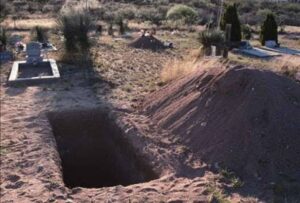
“Papa was not feeling when we took him to Aga Khan. The very next day my cousin who is a doctor called me and asked all of us to come and get tested,” said Murtaza informing that he is a resident of Nazimabad number 4, district central of Karachi.
Murtaza along with his mother, wife and three children went to the hospital to get tested not knowing that the next day would be a catastrophe. Four among six tests were positive of COVID-19.
Forty-three year old Murtuza, his wife Javeria, his mother Nasreen and his 10-year-old daughter were positive. His other two kids were negative. He immediately moved his healthy children to their grandmother’s house while the rest went into quarantine.
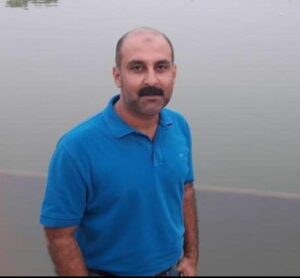
His father Muhammad Akbar Khan was 88 and had other medical conditions which is why his health deteriorated very fast. Akbar was moved to a ventilator on 1st of April, while the family was informed on April 2 at 8am about his ongoing condition and that he might not survive.
He thinks his father had contracted the virus from one of the two places. Either at a wedding just opposite to their house from where 11 cases came positive a week before his father was tested positive. Second, his father had a kidney condition for which he took him to Tabba Kidney center where he was transfused blood. “I believe he got infected from one of these two places,” Murtaza informed.
The government, police and Union council representatives have played a great role since the beginning said Murtaza. “After every two days my wife gets a call from our area police to ask if we needed anything, they know everyone in our house is quarantined,” the patient appreciated the system.
What happens after a COVID-19 patient dies
Executive Director JPMC
Jinnah Postgraduate Medical Center’s Executive Director, Dr Seemin Jamali while explaining process of COVID-19 deceased burial said that, the first thing they have to do when any COVID-19 patient dies is to inform the concerned district officer. “After informing we pack the body according to the guidelines of Government of Sindh, this includes complete Personal Protective Equipment (PPE),” she added.

The body is packed in double body bags, with gloves, masks, shoe cover, goggles, gown and face shield. The body’s hair and face should also be covered completely. It is packed inside an isolation ward and handed over by a specified team to a specific Edhi ambulance.
After the hospital’s protocol, the body is then given to Edhi Foundation. It remains under their supervision until it reaches its final resting place.
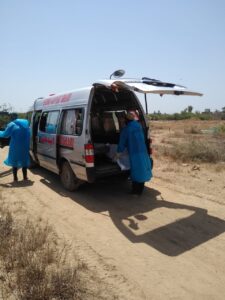
Edhi Foundation
Edhi Foundation’s Muhammad Bilal told othernews.pk that as soon as the body arrives at any of the two designated centers for Corona victims, one at Sohrab Goth and other at Korangi, the body is sprayed to disinfect with 0.5% chlorine and left for half an hour so that it does not contaminate workers.
After that, the body is washed with soap and packed. Packing isn’t an easy job, he said. According to the advised procedure the dead body is to be covered in a plastic bag first then a ‘Kafan’ (a cotton or linen cloth) and then again in a plastic bag. Lastly, the body is kept in a wooden coffin which is not allowed to be open by anyone.
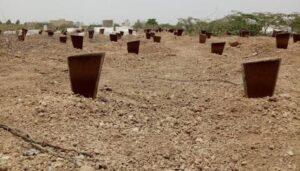
“We have designated a few ambulances especially for transportation of COVID-19 bodies while a group of 60 workers have been assigned for this task,” he said. He said that their workers are trained for this special task. He said that their staffers who clean and pack the bodies are to wear all PPE. So far dead bodies are only being buried in two graveyards in Karachi, one is Muhammad Shah graveyard while other is Edhi graveyard in Mawach Goth, he said.
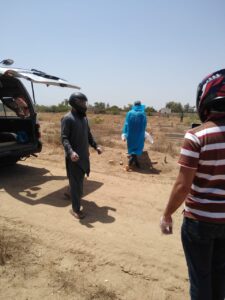
Government of Sindh
“Government of Sindh had established a team which looks after burial procedure and makes sure the guidelines are followed,” shared provincial minister for education and labour Saeed Ghani.
MB Darejo who is heading the Burial procedure in Karachi said “we have systemized the procedure to district level, where hospitals are to inform district offices then they inform Edhi and they do the rest.” “At the time of burial a police officer and an officer from the district office are mandatory to be present, they make sure none of the family members come close to the body so they won’t get the virus,” he added.

